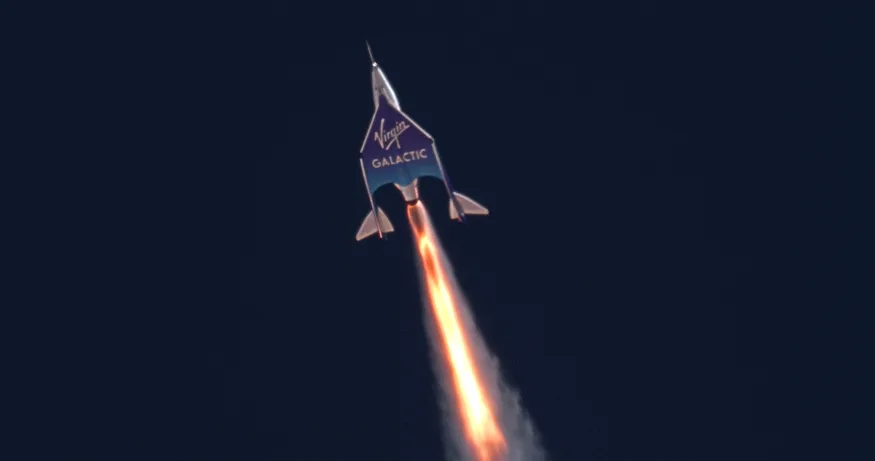Virgin Galactic, the pioneering space tourism company, achieved a significant milestone with the completion of its first-ever commercial flight. The remarkable journey commenced as the VMS Eve mothership launched the VSS Unity spaceship into the skies. Scaling heights of approximately 52 miles, the spacecraft ventured to the edge of space before making a safe descent and landing at Spaceport America in New Mexico. This successful mission, named Galactic 01, marked a groundbreaking moment for Virgin Galactic.
The company’s first fully crewed spaceflight took place back in 2021
The Italian government emerged as the first client to engage in microgravity research during the momentous flight. Notable individuals aboard the spacecraft included Air Force Colonel Walter Villadei, Air Force Lieutenant and flight surgeon Colonel Angelo Landolfi, and Pantaleone Carlucci, a research council member who served as the flight engineer and payload specialist. Piloting the Unity were retired U.S. Air Force Lieutenant Colonel Michael Masucci and Nicola Pecile, with the expertise of Virgin Galactic trainer Colin Bennett also present on board.

Although this momentous achievement unfolded smoothly, Virgin Galactic’s journey to reach this stage was not without its challenges. After initial successes with the SpaceShipTwo spaceplane tests conducted aboard the WhiteKnightTwo mothership in 2013, tragedy struck in 2014 when the VSS Enterprise crashed, leading to the loss of the co-pilot’s life and severe injuries to the pilot. However, the team persevered, and in 2016, they resumed flight testing with the glide test of the VSS Unity, ultimately reaching the boundary of space in 2018.
Virgin Galactic’s first fully crewed spaceflight took place in 2021, with founder Richard Branson aboard as Unity reached an altitude of 53.4 miles. Despite these achievements, the company encountered multiple delays in commencing commercial operations, primarily due to upgrades required for the VMS Eve mothership.
From a financial perspective, the successful commercial launch proved critical for Virgin Galactic. Having operated at a loss for several years, including a staggering loss of over $500 million in 2022 alone, the company has been eagerly anticipating revenue generation. Advertising seats at a price of $450,000 per ticket, Virgin Galactic had set a target of securing 1,000 reservations before embarking on their maiden commercial voyage
In the sector of suborbital tourism, Virgin Galactic faces competition from Blue Origin, led by CEO Jeff Bezos. Blue Origin utilizes a traditional rocket system rather than an airplane mothership. Bezos has expressed the view that Virgin Galactic’s experience falls short of delivering a true spaceflight encounter, as Blue Origin’s rocket reaches an altitude surpassing 62 miles, transcending the Kármán line often considered the boundary of space. However, other experts maintain that the threshold lies at 50 miles. Blue Origin has faced its own set of challenges. In a notable incident last year, one of its New Shepard rockets encountered a booster failure shortly after liftoff. Fortunately, the company’s escape system functioned as intended, ensuring the uncrewed capsule’s safety.
Another competitor in the field, SpaceX, distinguishes itself by offering customers an entirely different experience. SpaceX’s Falcon 1 rocket and Crew Dragon capsule enable individuals to embark on true orbital journeys. Notably, the company recently facilitated a private 10-day mission to the International Space Station, reportedly charging a fee of $55 million for the service.
RELATED:
- Virgin Galactic Ventures into Commercial Spaceflights with Historic Galactic 01 Mission
- Space Travel Just Got Easier: SpaceX is Setting Up a Commercial Space Station
- Best Gaming Monitor of 2023: Acer, Asus, Dell, Lenovo & More
(Via)





